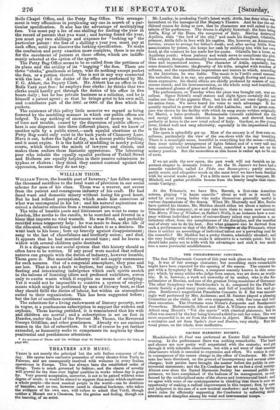THEATRES AND MUSIC.
VERDI is not merely the principal but the sole Italian composer of the day. His operas have exclusive possession of every theatre from Turin to Palermo, and are consequently received with welcome in every Italian operahouse in Europe. This has always been the established order of things. Taste is much governed by fashion; and the charm of novelty will prevail for the time over higher qualities in works whose day is gone by. Very general acceptation, moreover, is not to be gained without some degree of merit: it would be absurd to suppose that music which captivates a whole people—the most musical people in the world—can be destitute of beauties; and no one, however cased in classical buckram, who takes the evidence of his own ears, will -refuse to admit that Verdi, though neither a Mozart nor a Cimarosa, has the genius and feeling, though not the learning, of an artist. Mr. Lumley, in producing Verdi's latest work, Attila, has done what was incumbent on the manager-of Her Majesty's Theatre. And he has the ad_ ditional reason for doing so now, that its characters are well suited to the talents of his performers. The drama is slightly historical; the hero being Attila, King of the Huns, the conqueror of Italy. Having destroyed Aquileia, slain " the lord of the city," and made his daughter, Odabella, prisoner, Attila falls in love with his captive. She, however, an Amazonian heroine, swears to avenge her father's death; and, after saving Attila from assassination by poison, she keeps her oath by stabbing him with her own hand, at the moment he has made her his queen. Odabella bas a lover, an Aquileian youth; whose jealousy and wrath serve to complicate the plot. This subject, though dramatically incoherent, affords room for strong situa- tions and impassioned scenes. The character of Attila, especially, has some dramatic features; thesferocity of his tribe, mingled with touches of softness, and the superstitious impressions and terrors to which, according to the historians, he was liable. The music is in Verdi's usual manner. His melodies, that is to say, are generally trite, though flowing and some- times expressive; his choral effects are chiefly produced by masses of um_ sonous sound; and his instrumentation, on the whole noisy and inartificial, has occasional gleams of grace and delicacy.
The performance, on Tuesday when the piece was brought out, was ex- cellent. Signor Beletti's small stature and slight figure certainly did not realize our idea of the gigantic Hun; but his air did not want dignity, nor his action force. We never heard Lis voice to such advantage. It fre- quently recalled in power that of the elder Lablache; and its great com- pass was shown by the facility with which he sang music written originally for Marini, a basso profondo. Mademoiselle Cruvelli exhibited the fire and energy which seem inherent in her nature, and showed herself perfectly at home in the new vocal school of Italy. Gardoni, as the young lover, looked well and sang admirably, especially in the impassioned duet in the first act.
The opera is splendidly got up. Most of the scenery is of first-rate ex- cellence, particularly the view of the sea-shore with the day breaking. There is a moonlight scene, beautiful in everything but the moon—which, from some unlucky arrangement of lights behind and of a very tall tree with curiously twisted branches in front, resembled a target set up for archery practice. But the moonshine at this house is rather apt to be out of sorts.


























 Previous page
Previous page